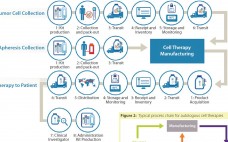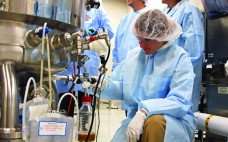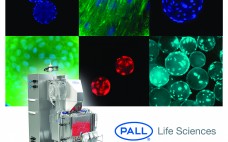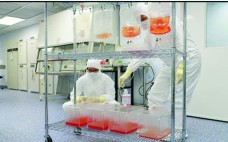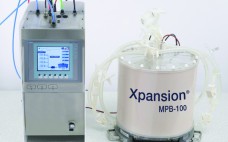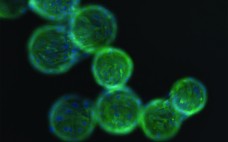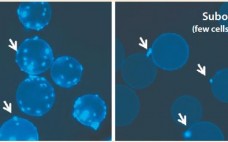Cell therapy is an emerging pillar in healthcare with the potential to provide curative solutions to a wide range of indications. The biological complexities through which cell technologies exert their clinical impact (especially those used in immunotherapies for cancer) provide opportunities for novel modes of immune regulation, cell targeting, and payload delivery. Cells also can serve as vehicles for genetic content, which the gene therapy industry is now investigating. Since early 2004, Invetech has worked with organizations dedicated to cell…
Manufacturing
Mapping Success for Commercial Cell Therapy Manufacturing
Commercializing cell therapies can be much more challenging than commercializing traditional pharmaceuticals and biologics. Cell-based drug products are significantly more complex than protein or small-molecule drug products. Their mechanisms of action and product attributes are also more complex. Cell therapy product attributes rely heavily on the associated manufacturing processes. Process changes can influence products in ways that may not be discernible until their effects on efficacy effects become evident. Product characterization is critical, but cell therapy products are living organisms…
The Cell Therapy Supply Chain: Logistical Considerations for Autologous Immunotherapies
Among the basics of building a successful logistics strategy for the management of cell-based material, some better-known and important factors to consider include selecting the right dry-shipping unit, qualifying that container for a particular payload and shipping configuration, choosing an appropriate data logger, creating a chain of custody, evaluating a transit carrier, and anticipating potential problems inherent in shipping at cryogenic temperatures (1). Here, I’d like to go beyond those basics to address some lesser-known considerations. These factors may be…
Comprehensive Hands-On Training for Biopharmaceutical Manufacturing: BTEC’s Program to Deliver Training to FDA Investigators
Training and continuing education play a vital role in carrying out the US Food and Drug Administration’s mission to protect and promote the public health — not only for consumers, health professionals, and industry, but also for the agency’s own personnel. Since 2008, the Golden LEAF Biomanufacturing Training and Education Center (BTEC) at North Carolina State University has filled a niche in the agency’s internal training program and provided a series of courses to more than 100 FDA investigators. The…
Enabling Cell Therapy Manufacturing
As this special Pall supplement of BioProcess International issue goes to press, progress continues in the field of cell therapy research. The revival of cell (and gene) therapy has been driven by some positive achievements that have occurred over the past decade. Cell therapy products differ in many ways from traditional small-molecular and biologic products. The main difference is that, contrary to traditional biopharmaceutical applications in which cells secrete the product of interest, in cell therapy applications cells are the…
Positioning for Success: An Interview with Mario Philips
On 12 March 2015, BPI met with Mario Philips, president, single-use technologies, at Pall’s Port Washington, NY, facility, to learn about Pall’s reasons for entering the cell therapy market. Also participating in the discussion was Alain Fairbank, director of marketing for cell therapies at Pall Life Sciences. Read the full text of this article in the PDF (Login required).
Meeting Lot-Size Challenges of Manufacturing Adherent Cells for Therapy
Adherent cells such as adult primary cell lines and human multipotent (MSCs) and pluripotent stem cells (hPSCs) present a manufacturing challenge as lot sizes increase from 109 (billions) to 1012 (trillions) cells (1). Typically, manufacturing platforms are good for one log of expansion. So new methods will be required to achieve commercially relevant lot sizes. Traditional two-dimensional culture methods have been used to grow anchorage-dependent cell types. Although such methods are reliable and well defined, they are very labor intensive…
Scaling Up Stem Cells: Moving from Laboratory to Commercial Production with a Single-Use Multiplate Bioreactor
Cell-based products are becoming increasingly important as potential biotherapies. Cell therapy is predicted to have a huge impact on the healthcare sector over the coming decades. Stem cells, in particular, are investigated as potential treatments for a diverse range of applications (such as heart disease and metabolic and inflammatory disorders) in which they might be used to restore lost biological functions. Read the full text of this article in the PDF (Login required).
Expansion and Characterization of Mesenchymal Stem Cells on Pall SoloHill® Microcarriers
Mesenchymal stem cells (MSCs) are self-renewing cells that differentiate into several terminally differentiated cell types. These cells have been isolated from multiple sources such as bone marrow, adipose tissue, peripheral blood, and other adult tissues(1–6). The interest in these cells is that they hold the potential to cure disease and are being pursued in clinical trials. Three emerging fields of interest for stem cells are cell therapy, regenerative medicine and screening of candidate drugs. In many cases, poor correlation between…
Strategies for Microcarrier Culture Optimization
The process of delivering an allogeneic stem-cell therapy to patients requires isolation and expansion of rare tissue-specific stem cells, which are subsequently delivered to individual patients for treatment. One type of cell used for such therapies is commonly known as human mesenchymal stem cells (hMSCs). They have been isolated from a number of tissues: e.g., bone marrow, heart, brain, placenta, and umbilical cord. And they have been shown to be immune-privileged in that hMSCs elicit no graft-versus-host (GvH) response such…



